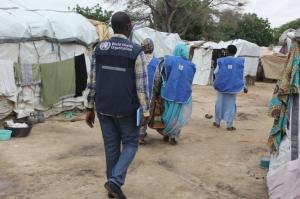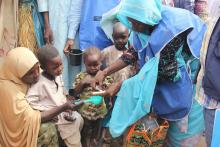Adamawa launches first ever Malaria chemoprevention campaign
Yola, 30 August, 2018 - Adamawa state has launched the first ever malaria prevention campaign targeting vulnerable children in high-risk areas of Adamawa state.
The campaign which starts today 29 August will be conducted through 02 September 2018, with the goal of reaching more than 100,000 children aged three (3) to 59 months in over 900 settlements including nomadic and hard-to-reach areas of Michika, Mubi South and Mubi North local government areas ( LGAs). These areas were prioritised based on the estimated food insecurity and anticipated malnutrition. The risk of death from malaria is increased in children with malnutrition.
Ahead of the campaign, the World Health Organization (WHO) and partners provided and distributed required antimalarial drugs according to the micro plans for the 30 implementing wards, trained over 620 volunteers as drug administrators, mobilized communities including traditional and religious leaders to ensure that all eligible children are reached during the exercise.
Adamawa is one of the states mostly affected by the ongoing insurgency in North-East Nigeria. As a result, nearly half (46%) of 1 120 health facilities assessed by WHO Health Resources and Mapping System (HeRAMS) is fully or partially damaged; and thus weakening the healthcare service delivery.
In 2017, according to the Commissioner for Health, Dr Fatima Atiku-Abubakar, malaria accounted for 70% of over 850 000 cases of reported fever in Adamawa state. “Malaria burden in the state as at 2017 is 70% (605,366 out of 856,086) reported cases of fever,” she said and added that, “Most of the affected people were women and children. Hence, a seasonal malaria chemoprevention campaign targeting children in high risk locations like Mubi and Michika is simply well-timed.”
The use of seasonal malaria chemoprevention preventive strategy (SMC) was successful during the first implementation in Borno state, in 2017 with impressive results. “WHO is extending the scheduled seasonal malaria chemoprevention campaign to high risk areas in Adamawa following the positive impact, similar exercise showed in Borno state last year,” said Dr Wondimagegnehu Alemu, WHO Country Representative to Nigeria.
Malaria is a life-threatening disease caused by parasites that are transmitted to people through the bites of infected female Anopheles mosquitoes. In 2015, there were more than 200 million cases of malaria and 437,000 deaths worldwide. More than 90% of malaria deaths occur in Africa. However, malaria is preventable and curable and no one should die from malaria.
Kindly follow us on Social Media:




